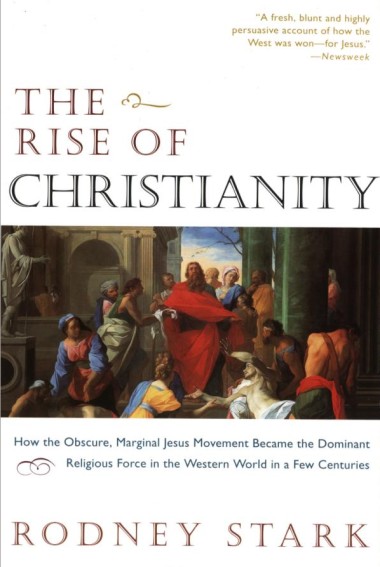
Qoheleth’s hardly startling ‘end of the matter’ in his search for contentment was this: “Fear God and keep his commandments.” (Ecclesiastes 12:13)
Rodney Stark seeks an explanation for the curious and phenomenal growth of the church over its first three centuries. His “end of the matter” is no less underwhelming:
“Christianity did not grow because of miracle working in the marketplaces (although there may have been much of that going on), or because Constantine said it should, or even because the martyrs gave it such credibility. It grew because Christians constituted an intense community, able to generate the ‘invincible obstinacy’ that so offended the younger Pliny but yielded immense religious rewards. And the primary means of its growth was through the united and motivated efforts of the growing numbers of Christian believers, who invited their friends, relatives, and neighbors to share the ‘good news.'” (page 208)
Let me break that down.
“Christianity did not grow because of miracle working in the marketplaces (although there may have been much of that going on)….”
Christianity does not grow primarily through show and spectacle. Arena crusades and powerful testimonies have their impact – and nothing that is said here is meant to disparage such things – but spectacle is not the engine driving the transforming power of the church.
“Christianity did not grow because… Constantine said it should, or even because the martyrs gave it such credibility.”
Hope for the church does not depend upon the attitude of those in power. Certainly an official act or a martyr’s death will have local impact and implications. But the long term growth of the church and its power over a society depends little upon these things. (This is particularly because the persecutions focused upon leaders while Christianity’s power was not generated from the top down.)
“It grew because Christians constituted an intense community, able to generate the ‘invincible obstinacy’ that so offended the younger Pliny but yielded immense religious rewards.”
The key word here is community. Christianity drew people into a counter-cultural community which was not cut off from the world around it, and as such, revitalized that culture. Christians found ways to address the chronic problems plaguing Greco-Roman cities, and at some sacrifice invested themselves in addressing those needs. That is, the Christian community was obstinately relevant. In an eye-opening chapter on the nature of life in ancient cities, he pulls these things together:
“Any accurate portrait of Antioch [as an example city] in New Testament times must depict a city filled with misery, danger, fear, despair, and hatred…. Christianity revitalized life in Greco-Roman cities by providing new norms and new kinds of social relationships able to cope with many urgent urban problems.” (pages 160, 161)
This is not the place to develop this, but in essence Christians made themselves relevant to the questions and issues which shadowed their neighbors’ lives.
Finally,
“And the primary means of its growth was through the united and motivated efforts of the growing numbers of Christian believers, who invited their friends, relatives, and neighbors to share the ‘good news.'”
Stunning, isn’t it, to discover that the church then grew by Christians having such a passion for this new community and the Christ who was its head that they invited them to share in it.
//// \\\\
The book is a fascinating portrait of how Christianity overwhelmed the Roman Empire. It forces upon us the ‘relevance’ question. What are the social/cultural needs of a community like my own, Bradenton, Florida, which we are overlooking and not addressing and therefore condemning ourselves to irrelevance? Are we providing the answers to the questions the culture is asking, or are we too busy providing answers that the culture is NOT asking? And do we think of ‘relevance’ in strictly a ‘sermon’ sense (“Pastor, you need to preach more ‘relevant’ sermons.”)? It was the whole community of the church that was living and acting and believing and serving in a way that made their presence transforming.
Further, the book may suggest that we depend too much upon the charisma and giftedness of our leadership to the detriment of the ministry and gifts of the community as a whole. When persecutions arose, the Romans focused upon the leaders, thinking that the power of the church flowed from its leadership to its laity. That may be the case today – but it was not in those days in which the church was turning the world upside down.
